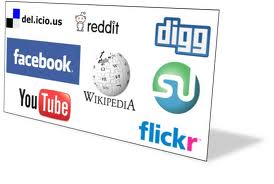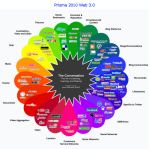
Logo Social Media Alain Classe
While many SEOs had assumed this was happening already, this announcement about new ways social media is impacting traditional SEO marked the first time that links within Facebook and Twitter were actually confirmed as a ranking factor by search engines representatives.
Feel free to review and apply this information to your own marketing efforts to experience the full benefits of SEO on search ranking for free organic traffic to your site.
- Quantity of Friends/Followers – just as with links, it’s likely the case that “more is better”, though there will likely be caveats; low quality bots and inauthentic accounts are likely to be filtered (and may be much easier to spot than spammy links, due to the challenge they find in getting any “legitimate” friends/followers).
- Importance of Friends/Followers – the friends/followers you have, like the link sources you have, are also probably playing a role. Earn high “authority” followers and you yourself must be a high authority person.
- Analysis of Friends/Followers Ratios – Much like the engines’ analysis of the editorial nature of links, consideration of whether a social user is engaging in following/follower behavior purely out of reciprocity vs. true interest and engagement may be part of authority scoring. If you have 100K followers and follow 99K of them, but the engagement between you and your followers is slim, you’re likely not as authoritative as an account with 100K followers + 5K following, but those followers are constantly engaged, retweeting, liking, sharing, etc.
- Topic Focus / Relevance – The consistency or patterns between your sharing behaviors could also be a consideration, using topic analysis, patterns in the sources of shared/tweeted links, etc. Being an “authority” could even be subject-specific, such that when a prominent SEO tweets links to celebrity news it has less of an impact than when they tweet links to a web marketing resource.
- Association Bias – It is also suspected that Google and Bing will include associating social authors with the sites/domains they’re “part of” vs. independent from. Sometimes, this might be as easy as looking at the URL associated with the account, other times it could be based on patterns like where you most often tweet/share links to or whether your account is listed on pages from that site.
The most exciting part about this is the potential to reduce webspam and return to a more purely editorial model. While people often link to, read and enjoy sources that link out manipulatively, very few of us will be likely to follow a Twitter account, friend someone on Facebook, or “like” something in a social site that’s inauthentic, manipulative or spammy.
The social graph isn’t necessarily cleaner, but the complexity of spam is far lower.
Here’s to the evolution of organic search marketing; search, social, content, blogs, links – it’s all coming together faster than ever before and that’s a very good thing for authentic, content minded web marketers like us.
Posted by Alain Classe
46.224248
6.132383










You must be logged in to post a comment.